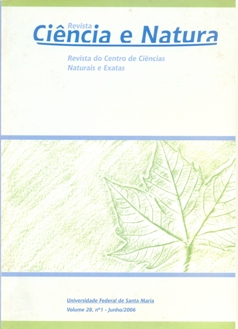Estimativa de Biomassa e Carbono em Plantios de Pinus Taeda l. Utilizando Imagens do Satélite Ikonos II
DOI:
https://doi.org/10.5902/2179460X9708Resumo
O presente trabalho teve como objetivo desenvolver metodologia utilizandoimagens do satélite IKONOS II para realizar estimativas de biomassaaérea e carbono orgânico em plantações de Pinus taeda. O desenvolvimentometodológico foi realizado inicialmente com a obtenção dos dados, seguindo-seda análise estatística da matriz de correlação entre os valores das bandas e índicesde vegetação e os dados de biomassa aérea e carbono orgânico, o ajuste e seleçãode equações para estimar a biomassa e o carbono orgânico como variáveis dependentesem função de variáveis independentes provenientes das imagens de saté-lite, tais como a reflectância das bandas MS-1, MS-2, MS-3, MS-4, Razão deBandas (MS-4/MS-3), NDVI e SAVI, e a quantificação das variáveis dependentespara toda a área de estudo. A utilização de imagens provenientes do satéliteIKONOS II apresentou resultados satisfatórios, possibilitando com quequantificações da biomassa aérea e carbono possam ser realizadas, necessitandopara tanto que modelos matemáticos sejam ajustados.Downloads
Downloads
Publicado
Como Citar
Edição
Seção
Licença
Para acessar a DECLARAÇÃO DE ORIGINALIDADE E EXCLUSIVIDADE E CESSÃO DE DIREITOS AUTORAIS clique aqui.
Diretrizes Éticas para Publicação de Revistas
A revista Ciência e Natura está empenhada em garantir a ética na publicação e na qualidade dos artigos.
A conformidade com padrões de comportamento ético é, portanto, esperada de todas as partes envolvidas: Autores, Editores e Revisores.
Em particular,
Autores: Os Autores devem apresentar uma discussão objetiva sobre a importância do trabalho de pesquisa, bem como detalhes e referências suficientes para permitir que outros reproduzam as experiências. Declarações fraudulentas ou intencionalmente incorretas constituem comportamento antiético e são inaceitáveis. Artigos de Revisão também devem ser objetivos, abrangentes e relatos precisos do estado da arte. Os Autores devem assegurar que seu trabalho é uma obra totalmente original, e se o trabalho e / ou palavras de outros têm sido utilizadas, isso tem sido devidamente reconhecido. O plágio em todas as suas formas constitui um comportamento publicitário não ético e é inaceitável. Submeter o mesmo manuscrito a mais de um jornal simultaneamente constitui um comportamento publicitário não ético e é inaceitável. Os Autores não devem submeter artigos que descrevam essencialmente a mesma pesquisa a mais de uma revista. O Autor correspondente deve garantir que haja um consenso total de todos os Co-autores na aprovação da versão final do artigo e sua submissão para publicação.
Editores: Os Editores devem avaliar manuscritos exclusivamente com base no seu mérito acadêmico. Um Editor não deve usar informações não publicadas na própria pesquisa do Editor sem o consentimento expresso por escrito do Autor. Os Editores devem tomar medidas de resposta razoável quando tiverem sido apresentadas queixas éticas relativas a um manuscrito submetido ou publicado.
Revisores: Todos os manuscritos recebidos para revisão devem ser tratados como documentos confidenciais. As informações ou ideias privilegiadas obtidas através da análise por pares devem ser mantidas confidenciais e não utilizadas para vantagens pessoais. As revisões devem ser conduzidas objetivamente e as observações devem ser formuladas claramente com argumentos de apoio, de modo que os Autores possam usá-los para melhorar o artigo. Qualquer Revisor selecionado que se sinta desqualificado para rever a pesquisa relatada em um manuscrito ou sabe que sua rápida revisão será impossível deve notificar o Editor e desculpar-se do processo de revisão. Os Revisores não devem considerar manuscritos nos quais tenham conflitos de interesse resultantes de relacionamentos ou conexões competitivas, colaborativas ou outras conexões com qualquer dos autores, empresas ou instituições conectadas aos documentos.






